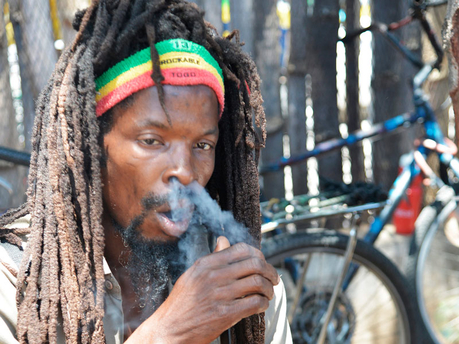Edmond Campbell, Senior Staff Reporter
“A GREAT relief and a step in the right direction” is how Horace Matthews, a leader of the Rastafarian movement in Jamaica,
is describing a proposed provision in the ganja law that will allow members of the Rastafarian faith to cultivate ganja on designated lands and use the weed for religious purposes, with authorisation from the minister of justice.
His comments came yesterday as the Upper House prepares to debate, in less than two weeks, the Dangerous Drugs Act (Amendment) 2015, which is intended to modify the existing legislative system that prohibits the use of ganja in Jamaica over the past 67 years.
Justice Minister Senator Mark Golding said it is anticipated that the Lower House will move expeditiously to give passage to the proposed statute following approval by the Senate.
In welcoming what is expected to be a significant change in the current law, that will set aside decades of restrictions on the Rastafarian community in using marijuana for religious purposes, Matthews said the senior members of the movement had never endorsed or recommended ganja for recreational use.
“It is to be used in designated areas such as the groundation or the tabernacle. We wouldn’t endorse anyone walking on the road smoking and saying he is using it for his spiritual purposes.”
However, he said there were different views among the Rastafarian brethren on the matter, but the most common position is that it should be used as a sacrament.
Matthews said younger members of the Rastafarian faith were advocating for total use of ganja, but the older members insist that it should be used “as our holy sacrament – it is for our meditation and when we are going to praise the most high”.
Senator Golding told journalists yesterday at the Jamaica House media briefing that debate is expected to start on January 30 and the bill will be tabled in the Senate this Friday.
Cabinet, on Monday, approved the tabling in the Houses of Parliament of the bill which will make the possession of two ounces or less of ganja a non-arrestable but ticketable infraction that would not attract a criminal record.
The new law, if given the nod by the legislature, will also permit the use of the weed for religious, medical, scientific and therapeutic purposes.
In addition, the proposed statute will open the door for the granting of licences to permit the development of a lawful industry for medical ganja and industrial hemp.
However, provisions in the bill, similar to that which is set out in the Tobacco Control Regulations, prohibit the smoking of ganja in public places.
Commenting on amendments relating to scientific and research purposes, Golding said the ganja law would permit the use of marijuana for research conducted by an accredited tertiary institution or any institution approved by the Scientific Research Council.
Under the proposed law, the minister responsible for science and technology could, by order, authorise an institution or body to cultivate and or import ganja or any part of the plant for scientific research.
A regulatory body called the Cannabis Licensing Authority will have the job of establishing a lawful, regulated hemp and medicinal ganja industry.
Golding also highlighted that a portion of the revenues from the licensing regime that is to be set up under the bill, would be used to support a public-education campaign to discourage the use of ganja by adolescents, persons with mental disorders, pregnant women, and other vulnerable persons.











